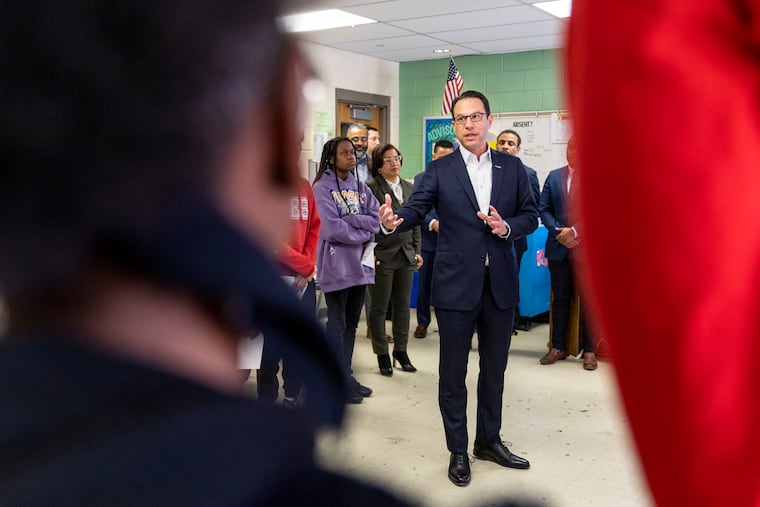Gov. Shapiro touts his plan to give tax breaks to new Pa. teachers, as a way to ease shortage
Gov. Shapiro said he wants to give newly certified teachers tax breaks of up to $2,500 annually for three years as a way to make the profession more appealing.

A decade ago, Pennsylvania issued licenses to 20,000 new teachers, enough so that the state’s classrooms were filled.
Last year, it certified just over 6,000.
“We have a teacher-shortage crisis here in Pennsylvania, and if we fail to act, if we fail to take these commonsense steps, we will have an even greater crisis,” Gov. Josh Shapiro said Wednesday, standing in the school library at George Washington Carver High School of Engineering and Science in North Philadelphia.
Shapiro, making his first visit to a Philadelphia school since he became governor in January, said he wants to give newly certified teachers tax breaks of up to $2,500 annually for three years as a way to make the profession more appealing.
It was his way of having Pennsylvania “put our money where our mouth is, to demonstrate just how vital we think teachers are,” Shapiro said.
The governor had outlined the new teacher tax-credit plan as part of his first budget proposal, introduced this month. Shapiro wants to add $567 million to the state’s basic education formula, with $100 million for mental health services and $100 million for school building fixes.
Carver teacher Paul Wagenhoffer, who introduced Shapiro, said he and a colleague had a chance to sit down with the governor to tell him what educators experience daily, and need from the state.
“One of the big things that we took away and that we tried to share with him is how important it is to not only keep us as teachers involved and keep us retained, but also make sure that we’re treated as professionals,” Wagenhoffer said. “And I feel that a lot of the pieces of this budget really do that.”
Shapiro, who also said Wednesday that Harrisburg Republican leaders have indicated they won’t appeal the landmark court decision finding Pennsylvania’s school funding unconstitutional, was visibly energized by his visit to Carver, a magnet school educating 900 students in grades 7 through 12.
He spent the better part of an hour inside Ian Doreian’s freshman seminar class, quizzing students on the three branches of government (they aced it) and explaining how a bill becomes law after it’s approved by both houses in Harrisburg.
“Literally, I’ve got to take a pen out of my pocket and sign it,” the governor said, a little incredulously.
After one student asked Shapiro if he always wanted to become governor (no, he didn’t), he told them about the day he flunked out of his premed program and got cut from the basketball team. Those stumbles shaped him, he said.
“I want you to know, it’s cool if you mess up, as long as you keep trying,” Shapiro said. Failing out and getting cut made him reevaluate his path, sharpen his focus. He began thinking about law and government as a way to serve people the way his mom, a Philadelphia teacher, and his dad, a Montgomery County pediatrician, did.
One student asked Shapiro plainly: What are you going to do to keep us safe?
Shapiro paused for a second.
“Right now, the adults are failing you,” the governor said. “We are not doing a good enough job.”
Shapiro said he thought more police officers were needed. Some students pushed back on that notion; police don’t make them feel protected, they make them feel suspected, they said. The governor listened, said he appreciated their perspective, and agreed that police needed more training and more positive community connections.
When it was time to leave the classroom, Shapiro gathered in close for a photo with the students, Superintendent Tony B. Watlington Sr., and school board president Reginald Streater, among other officials.
“There’s a whole lot of people who have your backs,” Shapiro said.